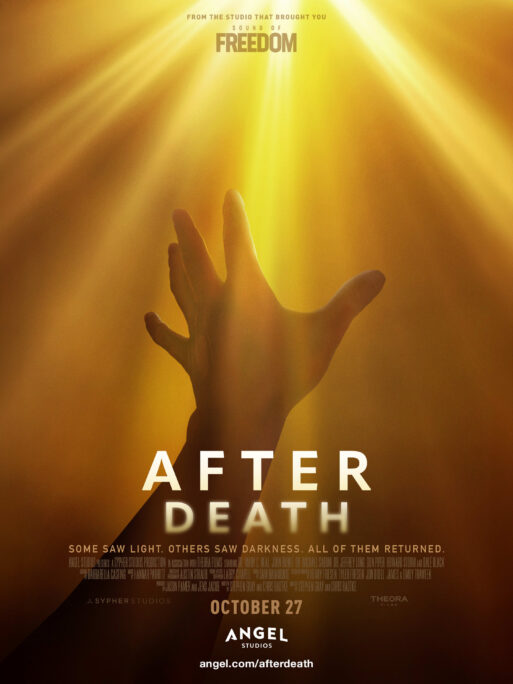 While near-death experiences, or NDEs, have been both researched and scrutinized for decades, the movie “After Death” portrays real life stories and re-enactments of these intriguing phenomena. While the production company Angel Studios is best known for its faith-based films, the producers also present potential scientific explanations behind these occurrences. Whether an attempt to balance the scales or broaden an audience, the film engendered mixed emotions among movie-goers.
While near-death experiences, or NDEs, have been both researched and scrutinized for decades, the movie “After Death” portrays real life stories and re-enactments of these intriguing phenomena. While the production company Angel Studios is best known for its faith-based films, the producers also present potential scientific explanations behind these occurrences. Whether an attempt to balance the scales or broaden an audience, the film engendered mixed emotions among movie-goers.
The documentary was released for limited engagements in 2,605 theaters throughout the United States on October 27, 2023. The feature-length film was the fourth-highest grossing film during it’s debut weekend, bringing in more than $5 million at the box office, according to Newsweek. Chief distribution officer of Angel Studios Jared Geesey stated, “We are thrilled by audience response, craving a theatrical experience for “After Death.”
Scientific speculations were presented throughout the documentary by cardiologist Michael B. Sabom, author of “Recollections of Death: A Medical Investigation.” The film also highlights a study on an EEG recording of a dying man’s brain that was randomly captured by medical professionals. Although emotions could not be measured, both theta and gamma waves were noted in neurological activity across the transition period to death. Still, an online review of the film by Variety was critical of the film’s religious overtones and scarcity of scientific evidence.
Beyond medical perspectives, firsthand accounts of NDEs are the crux of “After Death.” A majority of stories were shared by those who have written books about their experiences including John Burke, best-selling author of “Imagine Heaven.” Other personal NDEs were featured by those with prior untold experiences. One woman could observe and describe happenings during her brain surgery that she later recounted to surgeons. And Steve Kang, a young man who attempted suicide after using cocaine, recounted his NDE. He likened the initial experience to hell before calling out to Jesus, who showed him the light. Kang then awoke in the emergency room stating, “I don’t know how it works, but it is definitely a place we go.”
National Institutes of Health details that approximately 17% of people, who nearly die report an NDE. A few common NDE features for most include out-of-body experience, bright lights, reconnecting with deceased loved ones, and life review. Positive emotions are also thematic for the majority of NDE survivors. These commonalities were shared among those highlighted in the film, all of which also stated that a representation of Jesus was present during their NDE.
But some Christian moviegoers felt the film did not go far enough to position Jesus as the savior, posting their disappointment on the “After Death Movie” Facebook page. Others offer an opposing view. I watched the film along with a few hospice-oriented professionals, who were somewhat put off by the homogeneous representations of NDEs. Joanie Wolf, a former hospice nurse asserted, “It bothered me a little bit to hear some of the people that were recounting so much about Jesus. In my mind that kind of invalidated others.”

“After Death” moviegoers from left to right: Sara Joy, Joanie Wolf, Julia Gandy and Dana Watson
However, hospice massage therapist Julia Gandy was not as disheartened by the descriptors used, stating, “No matter what words we put to the experience, the desperate need to reconnect with source at that moment is tangible. The word we might use at that moment should be irrelevant to the experience itself, as one that is shared by all religions, beliefs, ethnicities, backgrounds or upbringings. Human conditioning keeps us separate. When we rise above, we realize we are all the same.”
Director Stephen Gray shared his personal perspective on the film’s intention with Deadline, professing, “My hope is that after watching “After Death,” it causes audiences to reflect and consider all of the evidence. Movies have a unique ability to help shape culture and this film allows us all to explore what happens when we die. We want everyone to come away feeling valued with a renewed sense of hope, that their life has meaning.”
The film is not yet available on streaming services, but is projected to be on several platforms in the coming months. Regardless of audience fulfillment or opinion, the bottom line is that we will only come to know the truth of the matter for ourselves after we die.

 “After Death” by Angel Studios
“After Death” by Angel Studios


 “As Tears Go By” by Marianne Faithfull
“As Tears Go By” by Marianne Faithfull

 Funeral Favors Offer Visitors a Tangible Memento
Funeral Favors Offer Visitors a Tangible Memento















